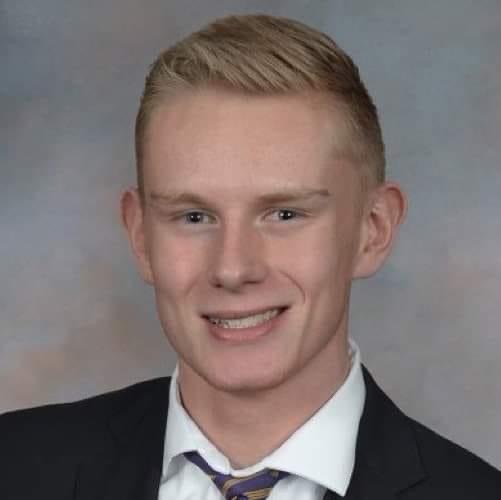Challey Spotlight: Cory Brodeur
Senior, Marketing
Cory Brodeur is a senior studying marketing with minor studies in strategic communication at NDSU. Originally from Apple Valley, Minnesota, he enrolled at NDSU in January 2018 and became involved with the Sigma Alpha Epsilon fraternity and the Greek Leadership program. Cory is a member of the Minnesota Air National Guard and recently completed a deployment in 2021. He is set to graduate this May and continue working as a marketing co-op with Doosan Bobcat.
Challey Institute activities: “Entrepreneurship and Human Action” reading group; “How Literature Reflects and Affects Society” reading group; “Society vs. The Environment” reading group; “The Rise and Fall of Dictatorships” reading group; “Recreating the Constitutional Convention of 1787”; forthcoming colloquium “The Political Thought of Frederick Douglass”
Why did you choose NDSU for your education?
When I toured NDSU, it was one of the last places on a long list of colleges I was going to see. Most other colleges gave me the impression of being like an upgraded high school or just an end to getting my degree. It wasn’t until I got to NDSU that I actually started to get really excited. On the tour, they talked about the extracurriculars, and it really made me start to think about how I can grow as a person and become a more well-rounded individual. People talk about that feeling you get when you belong somewhere, and I definitely felt it at NDSU. I knew I wanted to be here. It just felt right.
What led you to study marketing?
I actually started with a natural resource management major, but after taking some classes, I knew it wasn’t for me. I switched to marketing because I was always really interested in marketing as a mixture of two fields: the science aspect of psychology and sociology and the creative aspect. You know, I always thought I was going to have to choose between my creative and more technical sides, but marketing allows me to use both. You get the hard science in the foundational classes, where you learn about the “why” of marketing—why we do things and why it works. And then you get the creative learning in the “how”—how to get your message across and how to reach an audience effectively.
You have been a part of several reading groups and discussion colloquia. As you know, our goal with these programs is to promote civil discourse among students with diverse perspectives. What do you enjoy about these programs?
See, I could talk about this for hours. I think the biggest thing that makes my heart gush is the opportunity to learn about really interesting subjects that I wouldn’t have studied on my own. For example, the upcoming discussion on Frederick Douglass – I feel like I should have studied him more before, but this finally gives me the motivation and the opportunity to do it. I frequently find myself bringing up ideas that I learned about and discussed in the group. Everything I have learned has taken me so much further with my understanding. I also enjoy interacting with others. It’s huge to see how people have different mindsets, especially now when it’s difficult to have conversations that are really open. You can also realize the opposite, how someone with a different viewpoint is actually a lot more similar to you than you expected. It builds up a lot of bonds and creates a mixture of fun reading and learning reading. It has definitely sparked a lifelong learning that has encouraged me to continue reading more.
Can you give us an example of how these experiences impacted you?
Honestly, all of them have been impactful. One that really stands out was my experience in the “Recreating the Constitution” event. It was eye-opening to learn about this hugely important moment in U.S. history and to understand more of the context. We got to be characters at the convention and take on roles and ideas. It made you think differently, and it helped you understand the different sides of how the Constitution came to be.
The Challey Institute also hosts many events and speakers throughout the semester. How have these events benefitted you and other students at NDSU?
It all goes back to challenging your opinion and challenging your biases, understanding that there is more out there. I think the Passport Scholarship program [a program by the Challey Institute and the College of Business to encourage students to attend campus events] is helpful because it gets your foot in the door. After every speaker, I come away grateful, with new knowledge I didn’t know before and a new perspective I never thought about. For example, the recent talk about housing in Africa was really interesting. Learning about these things, especially around the world, opens your horizons and gives you a greater purpose. You feel connected to the bigger picture.
How have the scholarships and philanthropy through these programs made a difference for you?
The scholarships I have received have helped me in two ways. First, they have given me an extra layer of help in paying for my schooling. Even the smaller amounts stack up and make a big dent in paying off what I owe to the school. So, it has made the financial burden a lot easier. But second, it has also motivated me to try new things and keep reading. There are days when it was painstakingly hard, but the money helped keep me going. Knowing that I got a scholarship and that someone was supporting my efforts to learn, it really reinforced the fact that I had to keep trying.



